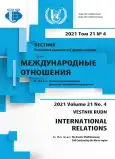Международные аспекты сепаратизма в современной Биафре
- Авторы: Денисова Т.С.1, Костелянец С.В.1,2
-
Учреждения:
- Институт Африки РАН
- Национальный исследовательский университет «Высшая школа экономики»
- Выпуск: Том 21, № 4 (2021): Большое Средиземноморье: продолжая конструировать макрорегион
- Страницы: 747-757
- Раздел: МИР И БЕЗОПАСНОСТЬ
- URL: https://journal-vniispk.ru/2313-0660/article/view/320279
- DOI: https://doi.org/10.22363/2313-0660-2021-21-4-747-757
- ID: 320279
Цитировать
Полный текст
Аннотация
Рост сепаратистских настроений стал одной из наиболее острых политических проблем, с которыми мир в целом и Африка в частности столкнулись в ХХI в. На Черном континенте сепаратистские движения с разной степенью интенсивности действуют более чем в 20 странах; одни выступают с требованиями отделения территории, другие - расширения автономии в рамках существующего государства. Большинство африканских проектов, нацеленных на отделение, остаются незначительными по размаху и безрезультатными, что в значительной степени объясняется отсутствием или слабостью международной поддержки сепаратистов и приверженностью мирового сообщества сохранению - за редким исключением - территориальной целостности государств. Анализируются причины возрождения - через несколько десятилетий после окончания гражданской войны между центральным правительством Нигерии и сепаратистами Биафры - движения за отделение этого восточно-нигерийского региона и международные аспекты разгорающегося конфликта, способного обострить и без того неспокойную военно-политическую ситуацию, сложившуюся в Западной Африке благодаря деятельности террористической организации «Боко Харам», исламистских группировок в зоне Сахеля, камерунских сепаратистов Амбазонии и т. д. Актуальность предмета исследования обусловлена как возрастанием угрозы сепаратизма в Африке, так и отсутствием в российской африканистике работ, посвященных современной ситуации в Биафре. Используя исторический подход, авторы анализируют характер внешнего участия в нигерийском конфликте 1967-1970 гг. и пути поиска международной поддержки современными биафрскими сепаратистами. Делаются выводы, что в силу различных внутренних обстоятельств, а также практического отсутствия материальной помощи извне создание новой «Республики Биафра», по крайней мере в ближайшее десятилетие, останется проектом-утопией, хотя сепаратистские настроения будут распространяться и препятствовать достижению внутриполитической стабильности в Западноафриканском регионе, на территории которого появляется все больше «горячих точек».
Ключевые слова
Об авторах
Татьяна Сергеевна Денисова
Институт Африки РАН
Автор, ответственный за переписку.
Email: tsden@hotmail.com
ORCID iD: 0000-0001-6321-3503
кандидат исторических наук, ведущий научный сотрудник, заведующая Центром изучения стран Тропической Африки
Москва, Российская ФедерацияСергей Валерьянович Костелянец
Институт Африки РАН; Национальный исследовательский университет «Высшая школа экономики»
Email: sergey.kostelyanyets@gmail.com
ORCID iD: 0000-0002-9983-9994
кандидат политических наук, ведущий научный сотрудник, заведующий Центром социологических и политологических исследований
Москва, Российская ФедерацияСписок литературы
- Andreeva, L. А. (2021). Judaism in Topical Africa: The phenomenon of the Igbo people (Nigeria). Vostok. Afro-Aziatskie Obshchestva: Istoriia i Sovremennost’, (2), 83—92. (In Russian). https://doi.org/10.31857/S086919080014160-3
- Bolshov, I. G., & Denisova, T. S. (Eds.). (2013). Nigeria: A reference monograph. Moscow: Institut Afriki RAN publ. (In Russian).
- Brucker, C. (2019). Finding foreign friends: National self-determination and related norms as strategic resources during the Biafran war for independence, 1967—1970. New England Journal of Public Policy, 31(2), 1—21.
- Byrne, T. (1997). Airlift to Biafra: Breaching the blocade. New York: Columba Press.
- Clapham, C. (1996). Africa and the international system: The politics of state survival. Cambridge: Cambridge University Press. https://doi.org/10.1017/CBO9780511549823
- Denisova, T. S., & Kostelyanets, S. V. (2021). Separatism in South Cameroon: Sources and prospects. Outlines of Global Transformations: Politics, Economics, Law, 14(1), 194—213. (In Russian). https://doi.org/10.23932/2542-0240-2021-14-1-10
- Doron, R. (2014). Marketing genocide: Biafran propaganda strategies during the Nigerian civil war, 1967—70. Journal of Genocide Research, 16(2—3), 227—246. https://doi.org/10.1080/14623528.2014.936702
- Filippov, V. R. (2016). “Françafrique”: The shadow of the Elysee palace over the Black continent. Moscow: Goryachaya liniya-Telekom publ. (In Russian).
- Geveling, L. V. (2001). Kleptocracy. Moscow: Gumanitariy publ. (In Russian).
- Hashimoto, T. (2014). The Foreign policy of counter secession. Preventing the recognition of contested states. Europe — Asia Studies, 66(9), 1578—1580. https://doi.org/10.1080/09668136.2014.956444
- Heerten, L., & Moses, A. D. (2014). The Nigeria—Biafra war: Postcolonial conflict and the question of genocide. Journal of Genocide Research, 16(2—3), 169—203. https://doi.org/10.1080/14623528.2014.936700
- Heraclides, A. (1994). Secessionist conflagration: What is to be done? Security Dialogue, 25(3), 283—293. https://doi.org/10.1177/0967010694025003004
- Katagoshchina, I. T. (1977). Intellectuals of Nigeria. Moscow: Nauka publ. (In Russian).
- Kuhn, K. J. (2013). Liberation struggle and humanitarian aid: International solidarity movements and the “Third World” in the 1960s. In S. Christiansen & Z. A. Scarlett (Eds.), Protest, culture and society (pp. 69—85). New York: Berghahn.
- Mazov, S. V. (2020). Soviet-Nigerian relations on the eve of and at the beginning of the Civil War in Nigeria, 1966—1967 (based on Russian archival sources). Istoriya, 11(8). (In Russian). https://doi.org/10.18254/S207987840011017-7
- Mazov, S. V. (2021). USSR and the self-proclaimed Republic of Biafra, 1967—1970 (based on archival documents). Asia and Africa Today, (6), 62—70. (In Russian). https://doi.org/10.31857/S032150750015264-2
- McConnell, F., Moreau, T., & Dittmer, J. (2012). Mimicking state diplomacy: The legitimizing strategies of unofficial diplomacies. Geoforum, 43(4), 804—814. https://doi.org/10.1016/j.geoforum.2012.01.007
- Mokrushina, Z. V. (2010). History of Civil War in Nigeria (1967—1970) (based on works of Nigerian writers and publicists). Vestnik Yaroslavskogo Gosudarstvennogo Universiteta im. P. G. Demidova. Serija Gumanitarnye Nauki, (4), 9—16. (In Russian).
- Nwankwo, A. A., & Ifejika, S. U. (1970). Biafra: The making of a nation. New York: Praeger Publishers.
- Obasanjo, О. (1984). Nigeria on fire. Moscow: Progress publ. (In Russian).
- Okeke, C. N. (1986). The theory and practice of international law in Nigeria. Enugu: Fourth Dimension Publishers. Retrieved from https://digitalcommons.law.ggu.edu/pubs/604
- Okonkwo, M. N. (2003). In the bowels of Biafra. Enugu: Vougasen.
- Okonta, I. (2012). Biafran ghosts. The MASSOB ethnic militia and Nigeria’s democratisation process. Nordic Africa Institute Discussion Paper, (73). Retrieved from http://www.diva-portal.org/smash/get/diva2:538466/FULLTEXT01.pdf
- Omenka, N. I. (1999). The Nigerian civil war: Outstanding and unspoken taboos. Bulletin of Ecumenical Theology, (11), 3—20.
- Romanov, A. I. (1987). Nigeria in a struggle for unity, 1967—1970. Moscow: Nauka publ. (In Russian).
- Seymour, L. J. M. (2013). Sovereignty, territory and authority: Boundary maintenance in contemporary Africa. Critical African Studies, 5(1), 17—31. https://doi.org/10.1080/21681392.2013.774791
- St. J Anstis, S. C., & Zacher, M. W. (2010). The normative bases of the global territorial order. Diplomacy & Statecraft, 21(2), 306—323. https://doi.org/10.1080/09592296.2010.482477
- Uzokwe, A. O. (2003). Surviving in Biafra. The story of the Nigerian Civil War. New York: Writers Advantage.
- Zotova, Yu. N., & Sledzevskii, I. V. (Eds.). (1981). History of Nigeria in modern and contemporary times. Moscow: Nauka publ. (In Russian).
Дополнительные файлы









